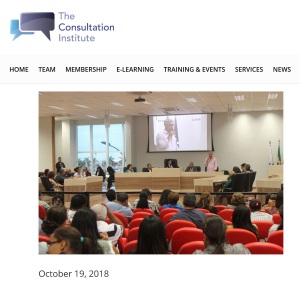 The Consultation Institute has highlighted how engaging stakeholders at the earliest stages of a development is more important than ever before, especially with the more prevalent role social media is taking in society, the role of experts, the influence ‘fake news’ is having on individuals’ trust in decision makers, and the role information and technology is now playing in developments and across society as a whole.
The Consultation Institute has highlighted how engaging stakeholders at the earliest stages of a development is more important than ever before, especially with the more prevalent role social media is taking in society, the role of experts, the influence ‘fake news’ is having on individuals’ trust in decision makers, and the role information and technology is now playing in developments and across society as a whole.
The Consultation Institute writes:
Trust in decision makers has been eroded, with Ipsos MORI’s annual veracity index – the longest running poll on trust in professions in Britain, having been asked consistently since 1983 – showing that Government Ministers and politicians are again the least trusted: 19% trust Ministers and 17% trust politicians more generally.
It turns out MP Michael Gove was wrong when he infamously declared that ‘The people of this country have had enough of experts,’ ahead of the Brexit referendum. And this is important, because the planning process increasingly relies on experts in a wide variety of disciplines, concerning air quality, building design, noise, traffic and visual impacts, nature conservation, socio-economic impacts, technology and of course construction techniques and safety.
Ipsos MORI’s results show that, while nurses remain the most trusted profession in Britain, with 94% of people trusting them (and 91% trusting doctors), ‘trust in scientists has equalled the highest recorded level – 83% now trust them to tell the truth’. This is up 20 points since 1987. Meanwhile, a US/UK study conducted by researchers at Queen Mary University, London published recently shows that scientists are trusted over politicians, even when the proposition is a series of fictitious nudges.
The study’s lead author, Dr Magda Osman said ‘what we show is that in actual fact, when compared to a government working group, the public in the US and UK judge scientists very favourably, so much so that they show greater levels of trust even when the interventions that are being proposed are implausible and most likely ineffective. This is partly because ‘overall, the public make pretty sensible judgments, and what this shows is that people will scrutinise the information they are provided by experts, so long as they are given a means to do it. In other words, ask the questions in the right way, and people will show a level of scrutiny that is often not attributed to them.’
Developers should not fear engaging earlier and using experts – as long as those experts are good communicators, the information being provided is relevant, accessible and timely. In our experience, early engagement is incredibly valuable and can help in ensuring all-important context is understood and a wider audience is reached. Moreover, it demonstrates a commitment to ensuring views – and improvements – are built into the final plans. This process also ensures local benefits are maximised and hard-wired, and impacts are avoided, mitigated or minimised.
Whilst there will always be opposition to larger or controversial developments, early engagement demonstrates a willingness to reach out to wider audiences and a different demographic, ensure representation from important groups whose views may be particularly relevant to the particular proposals, and gain detailed feedback that cuts through noisy campaigns and glib social media interactions. Critically, early engagement can play a vital role in ensuring developers avoid falling foul of the Gunning Principles. Recent high profile judicial reviews have demonstrated that projects can be successfully challenged for inadequate consultation, citing the Gunning Principles:
- Consultation must take place when the proposal is still at a formative stage
- Sufficient reasons must be put forward for the proposal to allow for intelligent consideration and response
- Adequate time must be given for consideration and response
- The product of consultation must be conscientiously taken into account
- The value of early engagement in ensuring Developers deliver a meaningful consultation, gain insight at a formative stage, provide adequate time and ensure views are conscientiously considered are clear and unambiguous.
Let’s face it, a judicial review or a failed or delayed planning process can cost hundreds of thousands of pounds. It makes sense to get it right first time.

